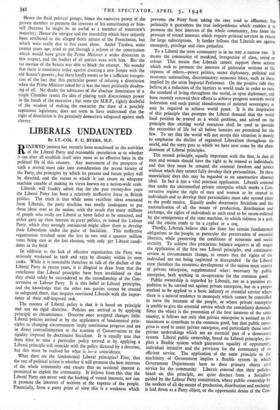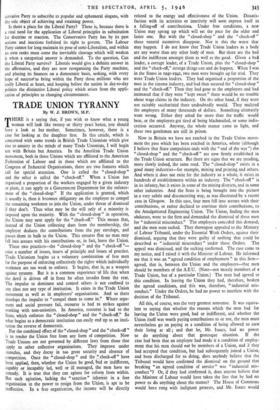LIBERALS UNDAUNTED
By LT.-COL. F. C. BYERS, M.P. RENEWED interest has recently been manifested in the activities of the Liberal Party and reasonable speculation as to whether it can after all establish itself once more as an effective force in the political life of this country. Any assessment of the prospects of such a revival must take into consideration the recent history of the Party, the principles by which its present and future policy will be directed, and the extent to which it can create an adequate machine capable of making its views known on a nation-wide scale.
Liberals will frankly admit that for the past twenty-five years the Liberal Party has been a relatively ineffective force in British politics. The truth is that while some excellent ideas emanated from Liberals, the party machine was totally inadequate to put these ideas over to the nation, with the result that many millions of people who really are Liberal at heart failed to be attracted, and either gave up their interest in party politics, or joined the Labour Party, which they wrongly considered might allow them to develop their Liberalism under the guise of Socialism. This ineffective organisation resulted none the less in two and a quarter million votes being cast at the last election, with only 307 Liberal candi- dates in the field.
In addition to the lack of effective organisation the Party was seriously weakened in 1918 and 1932 by disunity within its own ranks. While it is reasonable therefore to talk of the decline of the Liberal Party in recent years, it is illogical to draw from that the conclusion that Liberal principles have been invalidated or that they could safely be surrendered to the custodianship of the Con- servative or Labour Party. It is this belief in Liberal principles, and the knowledge that the other two parties cannot be trusted to safeguard them, that inspires convinced Liberals with the impor- tance of their self-imposed task.
The essence of Liberal policy is that it is based on principle and not on rigid doctrine. Policies are arrived at by applying principle to circumstance. Doctrine once accepted changes little. Liberal policies arrived at by the application of fundamental prin- ciples to changing circumstances imply continuous progress and are in direct contradistinction to the ruction of Conservatism or the rigidity imposed by doctrinaire Socialism. It is equally true that from time to time a particular policy arrived at by applying a Liberal principle will coincide with the policy dictated by a doctrine, but this must be realised for what it is—a coincidence.
What then are the fundamental Liberal principles? First, that the test of political action is whether it will promote the best interests of the whole community and ensure that no sectional interest is permitted to exploit the community. It follows from this that the Liberal Party can never seek the backing of vested interests, nor can it promote the interests of sections at the expense of the people. Financially, from a party point of view this is a weakness which prevents the Party from taking the easy road to affluence, but politically it guarantees the true independence which - enables it to promote the best interests of the whole community, free from the pressure of vested interests which require political services in return for large subscriptions. It further follows that Liberals are against monopoly, privilege and class prejudice.
To a Liberal the term community is in no way a narrow one. It means the community of mankind, irrespective of class, creed or colour. This means that Liberals cannot support those actions which seek to promote the interests of particular sections at the expense of others—power politics, secret diplomacy, political and economic nationalism, discriminatory economic blocs, such as those implied by the term Imperial Preference. On the positive side they believe in a reduction of the barriers to world trade in order to raise the standard of living throughout the world, in open diplomacy, and have recently renewed their efforts to achieve progress towards world federation and such partial abandonment of national sovereignty as may be required to achieve world peace. It is the inspiration of this principle that prompts the Liberal demand that the world food position be treated as a world problem, and solved on the principle that existing world resources shall be used to provide the necessities of life for all before luxuries are permitted for the few. To say that the world will not accept this situation is merely to emphasise the decline of organised Liberalism throughout the world, and the sorry pass to which we have now come by the aban- donment of Liberal principles.
The second principle, equally important with the first, is that all men and women should have the right to be treated as individuals, and that they must be ensured the essential freedom and justice without which they cannot fully develop their personalities. In these materialistic days this may be regarded as an unattractive abstract ideal. In fact it has a vital practical application. Liberals contend that under the uncontrolled private enterprise which marks a Con- servative regime the right of men and women to be treated as individuals and to develop their personalities must take second place to the profit motive. Equally under doctrinaire Socialism and the nationalisation of all the means of production, distribution and exchange, the rights of individuals as such tend to be steam-rollered by the omnipotence of the state machine, in which tidiness is a god, and the citizen tends to be a cypher or a cog.
Thirdly, Liberals believe that the State has certain fundamental obligations to the -people, m particular the preservation of essential
liberties, while preserving the conditions of economic and social security. To achieve this precarious balance requires at all stages the application of the first two Liberal principles, and continuous review as circumstances change, to ensure that the rights of the individual are not being neglected or disregarded. In the Liberal view therefore the economic development of the nation must consist of private enterprise, supplemented wher2 necessary by public enterprise, both working in co-operation for the common good.
Public ownership is regarded by Liberals, not as a punitive ex- pedition to be carried out against private enterprise, but as a proper method to be applied to a basic industry or essential service where
there is a natural tendency to monopoly which cannot be controlled to serve the interests of the people, or where private enterprise is unable to give the essential service which the community demands. Since the object is the promotion of the best interests of the com- munity, it follows not only that private enterprise is assisted to the maximum to contribute to the common good, but that public enter- prise is used to assist private enterprise, and particularly those small
private undertakings which are an essential part of a democratic system. Liberal public ownership, based on Liberal principles, im- plies a flexible system which guarantees equality of opportunity.
individual initiative and the provision for the community of an efficient service. The application of the same principle to the machinery of Government implies a flexible system in which Government Departments have as their primary object civil service for the community. Liberals contend that their policies, based on this principle, are quite distinct from a Socialism guided by the Labour Party constitution, where public ownership by the workers of all the means of production, distribution and exchange is laid down as a Party object, or the opportunist desire of the Con- scrvative Party to subscribe. to popular and ephemeral slogans, with the sole object of achieving and retaining power.
Is there a place for the Liberal Party? There is, because there is a vital need for the application of Liberal principles in substitution for doctrine or reaction. The Conservative Party has by its past actions and inactions forfeited its right to govern. The Labour Party cannot for long maintain its pose of semi-Liberalism, and within its own ranks must come the inevitable cleavage which will weaken it when a categorical answer is demanded. To the question, Can the Liberal Party survive? Liberals would give a definite answer in the affirmative, and they are now reorganising the Party machine, and placing its finances on a democratic basis, seeking, with every hope of succesa' to bring within the Party those millions who are really Liberal at heart, and keeping before the nation in day-to-day politics the distinctive Liberal policy which arises from the appli- cation of principles to changing circumstances.































 Previous page
Previous page